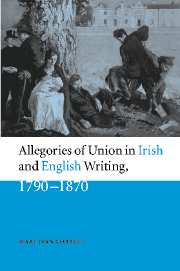 Allegories of Union in Irish and English Writing, 1790–1870
Allegories of Union in Irish and English Writing, 1790–1870 Book contents
- Frontmatter
- Contents
- Acknowledgments
- Introduction
- Chapter One Public affections and familial politics: Burke, Edgeworth, and Ireland in the 1790s
- Chapter Two Allegories of prescription: engendering Union in Owenson and Edgeworth
- Chapter Three Troubling others: representing the immigrant Irish in urban England around mid-century
- Chapter Four Plotting colonial authority: Trollope's Ireland, 1845–1860
- Chapter Five England's opportunity, England's character: Arnold, Mill, and the Union in the 1860s
- Afterword
- Notes
- Bibliography
- Index
Chapter One - Public affections and familial politics: Burke, Edgeworth, and Ireland in the 1790s
Published online by Cambridge University Press: 22 September 2009
- Frontmatter
- Contents
- Acknowledgments
- Introduction
- Chapter One Public affections and familial politics: Burke, Edgeworth, and Ireland in the 1790s
- Chapter Two Allegories of prescription: engendering Union in Owenson and Edgeworth
- Chapter Three Troubling others: representing the immigrant Irish in urban England around mid-century
- Chapter Four Plotting colonial authority: Trollope's Ireland, 1845–1860
- Chapter Five England's opportunity, England's character: Arnold, Mill, and the Union in the 1860s
- Afterword
- Notes
- Bibliography
- Index
Summary
Just after William Fitzwilliam arrived in Dublin in January 1795 to take up his short-lived post as Lord Lieutenant, Edmund Burke wrote a letter to a member of the Irish Parliament in which he posed his fundamental concern of that revolutionary decade: “My whole politicks, at present, center in one point; and to this the merit or demerit of every measure, (with me) is referable: that is, what will most promote or depress the Cause of Jacobinism?” In Burke's view, as in Fitzwilliam's, it was the redress of catholic grievances that would stave off revolution in Ireland: as he wrote further on in that same letter, “I am the more serious on the positive encouragement to be given to [catholicism], (always however as secondary [to the Church of Ireland]) because the serious and earnest belief and practice of it by its professors forms, as things stand, the most effectual Barrier, if not the sole Barrier, against Jacobinism” (Writings and Speeches 663).
Tolerating catholicism would have strategic political advantages for the emergent empire: as Burke had written in the Reflections on the Revolution in France (1790), all right-minded Englishmen of whatever creed would “reverently and affectionately protect all religions because they love and venerate the great principle upon which they all agree, and the great object to which they are all directed.
- Type
- Chapter
- Information
- Allegories of Union in Irish and English Writing, 1790–1870Politics, History, and the Family from Edgeworth to Arnold, pp. 21 - 50Publisher: Cambridge University PressPrint publication year: 2000


